There were countless key topics during this year’s ”Two Sessions” – constitutional amendments, a new government, and reforms in the supervisory system, to name but a few, all of which showed China’s resolve to change with the times and push forward. Hong Kong has its own role and function to play in China’s march forward, especially in the building of the Guangdong-Hong Kong-Macao Bay Area, where advantages and opportunities exist together.
CY Leung: Two Sessions dignified and decent
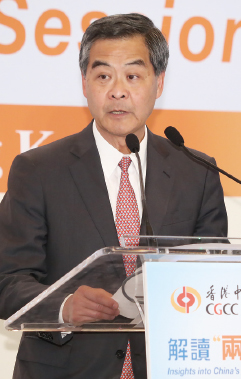
CPPCC Vice-Chairman CY Leung lauded the feel of this year’s meetings and commended the discipline of the representatives. In addition to the high attendance rate, there was a “dignified and decent atmosphere” with committee members coming prepared, participating actively in discussion and maintaining a good work spirit. During deliberation in the NPC, the 37 representatives from the Hong Kong delegation spoke a total of 309 times and made 179 recommendations. Leung cited the requirements that CCP Politburo Standing Committee Member and Secretary of the Central Commission for Discipline Inspection Zhao Leji had set out during the Joint Session on Hong Kong and Macao, which included leading the way in studying and promoting the constitution, the Basic Law and the “One Country, Two Systems” policy. In issues of principle relating to protecting the nation, securing sovereignty and promoting development, the policies of the CCP and the government should be followed, while the promotion of traditional Chinese culture and the achievements of prosperity and development in Hong Kong and Macao should be emphasized to foster a social consensus. Leung also commended Hong Kong committee members for their proactive comments during meetings, expressing their willingness to further collaboration, including work to educate, inform and guide Hong Kong society as a whole.
Following the “Two Sessions”, how should Hong Kong support and respond to the ideas expressed in the discussions and deliberation? Leung believes that in addition to attending meetings for two weeks every year, NPC deputies and CPPCC delegates should do more to carry out continuous, focused efforts. “Since the start of the reform and opening-up, Hong Kong has never just stood by, but has been a supporter, participant and advocator. In the deepening of reform and ever-increasing opening-up, China has started down a path that will make it strong and prosperous. Many sectors in Hong Kong can contribute to this process and benefit from rare opportunities that enhance their own development.” He emphasized the blood link and mutual destiny of people in Hong Kong and Mainland China and expressed his hope that Hong Kong would work to understand major policies coming out of the “Two Sessions” and participate in greater national development.
Dou Shuhua: Constitutional amendments key to modernization
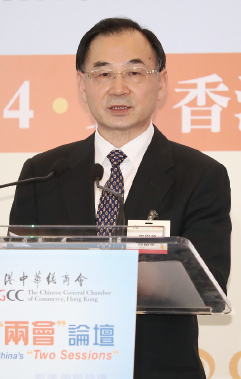
The focus of this year’s NPC meeting was the overwhelming passage of constitutional amendments. NPC Standing Committee Member and NPC Environment Protection and Resources Conservation Committee Vice-Chairman Dou Shuhua pointed out that these constitutional amendments have come at the right time, using the law of the land to enshrine important innovations in theory, practice and structures in the constitution, keeping it relevant to the times and further improved. Major amendments included the guiding role of Xi Jinping’s New Era concept of Socialism with Chinese Characteristics in national politics and social life, further explanation of the overall implementation of Socialism with Chinese Characteristics and goals for a second century of struggle, improvements on the rule of law and implementation of the constitution, further solidifying and strengthening of the comprehensive leadership of the Chinese Communist Party, regulations regarding the position of the National President, and the addition of regulations related to the National Supervisory Commission. He emphasized the importance of constitutional amendments in full implementation of the rule of law, a system for national administration and modernization of administrative capabilities.
The new supervisory act is another highlight of the sessions. Dou pointed out that this act contains important elements and key steps to deepening reforms in the supervisory system. He explained that the nine different sections of the act clarify the guiding concepts and leadership structure of supervisory functions, outlining steps for “creation of a centrally managed, highly authoritative national supervisory system with Chinese characteristics”, which will create a system of inspection, stationed personnel and supervision that will ensure that all public servants who exercise power will be fully supervised, providing a new weapon in the fight against
Liu Jiayi: Deepening supply-side structural reforms
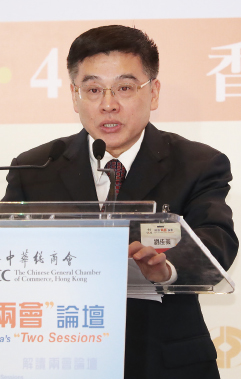
Deputy Director of the CPPCC Committee for Learning and Cultural Historical Data Liu Jiayi summed up analysis of trends in China’s economy by CPPCC members. He stated that in this year and next year, China’s economy will grow steadily, but certain problems may become more apparent, while retreats from policy might negatively affect China’s economic system. He pointed out that 2018 is a window of full implementation of key reforms, with the emphasis of adjustments being on an appropriate transition from “stable growth” to “driving reform” on the basis of “controlling risk”. Based on China’s stable economic growth, he predicts that China’s GDP will reach USD10,000 by the year 2020, and by the years 2035 and 2070 it will reach 50% and 70% of the US levels respectively, becoming a member of the high-income nations. However, China’s future must be invested in carefully. Problems like unbalanced development, aging populations and improved capabilities among the labor pool must all be considered.
As China enters its fortieth year of reform and opening-up, Liu believes that the government must deepen supply-side structural reforms and make good on promises to decrease productivity, decrease stock volumes, eliminate leverage, lower costs and make up for shortcomings. In addition, the government must also make good on three major areas - preparations to guard against major risks, a precise policy on eliminating poverty and preventing pollution; of these, guarding against financial risks is key. Liu pointed out that China currently faces major financial risk, including an excess of hidden bad loans in the real economy, an overly large proportion of highly liquid financial assets, and debt financing by local governments. The government must standardize and monitor these issues while closely monitor global economic and financial trends to prevent systematic and regional financial crises.
Ha Jiming: Merging banking and insurance regulations to avoid risk
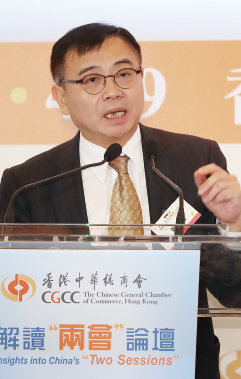
The passage of the Plan on Deepening Reform of Party and State Institutions during this year’s “Two Sessions” combined the China Banking Regulatory Commission and the China Insurance Regulatory Commission. Senior Researcher at the China Finance 40 Forum Ha Jiming believes that these reforms removed the possibility to reduce regulatory arbitrage while at the same time guarding against financial risk and in fact brings China in line with international practices. At the same time, national and local tax offices at the provincial level and below were combined, which he believes will resolve the problem of allocating financial rights and administrative authority. This year the Report on the Work of the Government maintained the principle of “residence not investment” in the real estate industry. Ha believes that the creation of a long-effect mechanism will replace administrative measures like purchase quotas and in the near future will see the issuing of a property tax.
When discussing the hotly-debated China-US trade war, Ha analyzed the situation from the perspective of the Bretton Woods System, through which the US’s attempted to improve the trade imbalance. After it failed, the US continued to have a foreign trade deficit. Furthermore, China’s position as the “world’s factory” importing intermediate products for production and assembly, then exporting finished products to the US and other countries, meant that the China-US trade surplus actually came about the same time when a trade deficit with China and many other countries began to form. The profit that China gained was minimal, but actual trade statistics show that China had a surplus.
Ha emphasized that no country wins in a trade war, adding that the customs policies implemented by the US will have little effect on China. The announcement of a 25% customs tax on USD50 billion in trade goods equals about USD12.5 billion, which is only 0.1% of China’s GDP growth. However, this is not an insignificant number for the GDP of the US. Since the months this measure was announced, American stock markets have ‘shrunk’ around USD1 trillion, or around 5% of the country’s GDP. The fact that a considerable amount of the American people’s money is tied up in the stock market means that if this continues, it will create a major problem. It is for this reason that he believes the possibility of a trade war breaking out is low.
The forum included a discussion period and invited NPC Standing Committee Member Tam Yiu-chung, NPC Deputies Ma Fung-kwok and Martin Liao, CPPCC Standing Committee Member Johnathan Choi, and CPPCC National Committee Members Margaret Leung and Kenneth Fok, who discussed in-depth and from a number of perspectives the opportunities and inspiration that the “Two Sessions” held for Hong Kong’s development in economics, finance, culture and youth.
Tam Yiu-chung: Attracting Hong Kong youth to the Bay Area
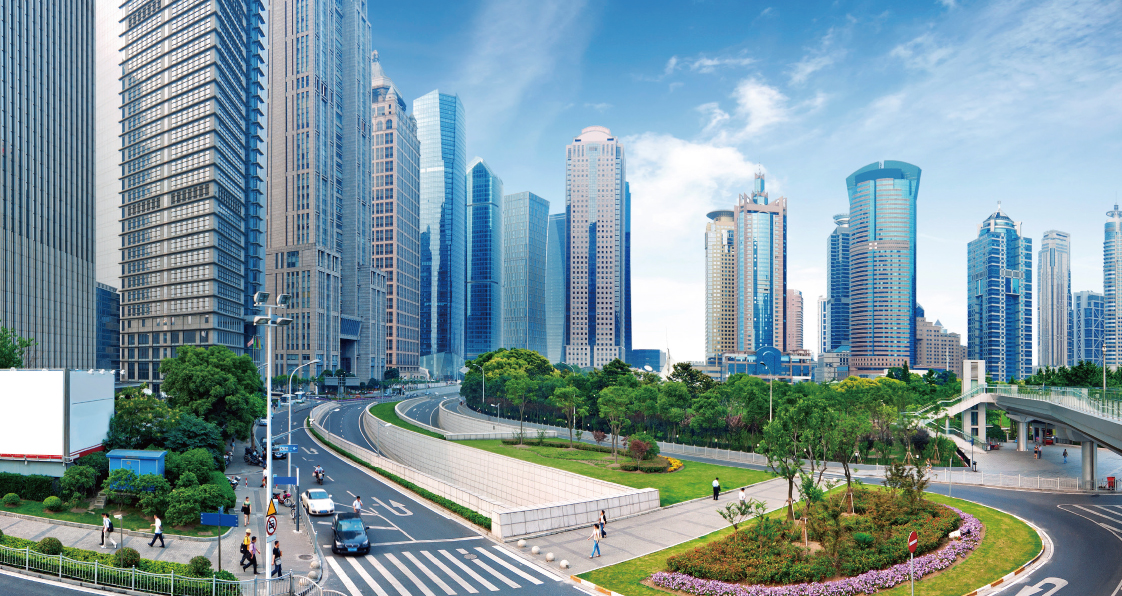 Tam believes that the cities within the Bay Area not only have a geographical connection, they also share similar languages, culture and customs. There is considerable potential for development and cooperation between Hong Kong and cities within the region in the cultural sector and he proposed that this be coordinated with youth efforts to create a “Bay Area Dream Factory” that would attract people from Hong Kong, especially young people, to the Bay Area to develop their careers while at the same time increase their understanding of China.
Tam believes that the cities within the Bay Area not only have a geographical connection, they also share similar languages, culture and customs. There is considerable potential for development and cooperation between Hong Kong and cities within the region in the cultural sector and he proposed that this be coordinated with youth efforts to create a “Bay Area Dream Factory” that would attract people from Hong Kong, especially young people, to the Bay Area to develop their careers while at the same time increase their understanding of China.
To increase knowledge about the Bay Area among different groups of people, Tam recommended that high-level forums be held to promote mutual exchange between cities within the Bay Area on its development. He also suggested an information sharing website be created for the Bay Area to share background information as well as information on setting up businesses, various industries and employment, which would provide Hong Kong residents with the latest information on developments in the Bay Area.
Ma Fung-kowk: Hong Kong’s seafaring culture good for “Belt & Road”
Ma said that all of the 11 cities in the Bay Area share a common Lingnan culture, while Hong Kong’s seafaring culture, a result of its colonial past and open society, gives it a unique opportunity to participate in the “Belt & Road” Initiative, particularly in connection with countries in Southeast Asia.
He noted that structural reforms in China were a highlight of this year’s “Two Sessions” and the more than 60 reforms put through were rather comprehensive. He believes that these reforms have five clear goals: 1. to create a system for the administrative functions for the Party and Government; 2. to build a system for coordination between leaders within the Party; 3. to create a system of government administration with clear responsibilities and based on the rule of law; 4. to establish a world-class national defence system that suits China’s unique needs; and 5. to establish a system for communication with individual citizens. Ma pointed out that Hong Kong can do more to understand these reforms and take advantage of the opportunities that they offer.
Martin Liao: Constitutional amendments guiding national ideology
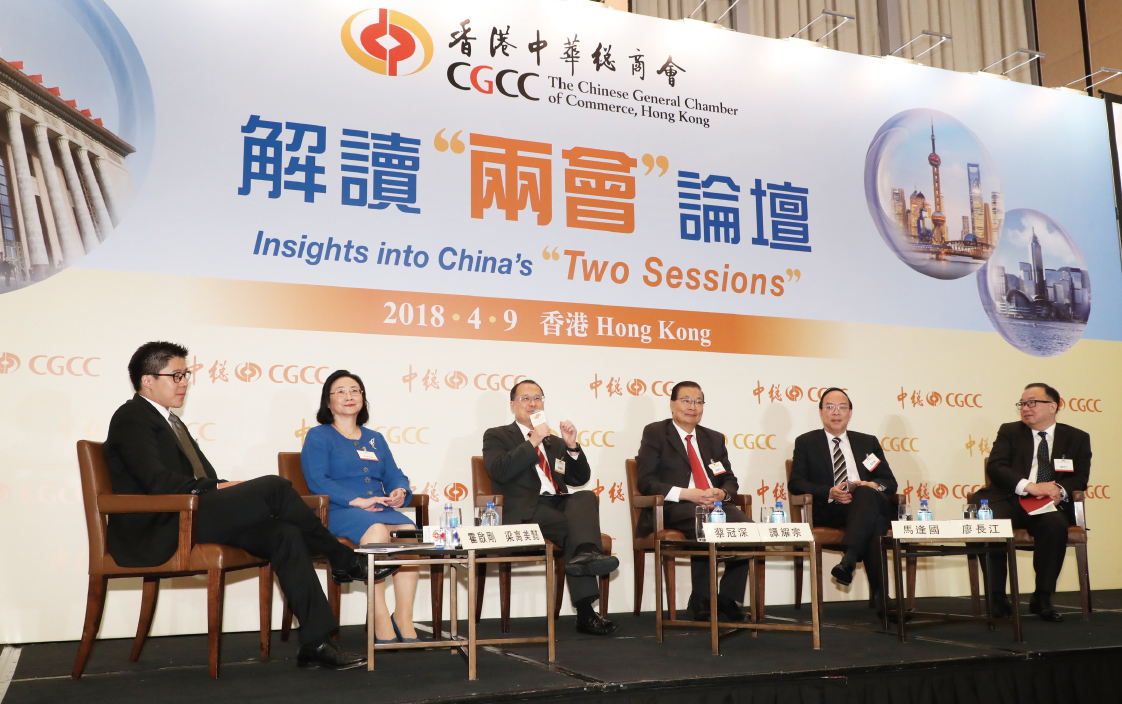 Constitutions contain laws that span generations. Liao believes that making changes at the appropriate time to remain current is necessary. Since the 18th CCP Congress, China has made historical advances, and important theoretical applications and systemic innovations resulting from this should be placed in the constitution.
Constitutions contain laws that span generations. Liao believes that making changes at the appropriate time to remain current is necessary. Since the 18th CCP Congress, China has made historical advances, and important theoretical applications and systemic innovations resulting from this should be placed in the constitution.
Liao stated that these amendments show the implementation of the spirit of the 19th CCP Congress and the elevation of the Party’s position to a national ideology. He also pointed out the strides that China has made in anti-corruption efforts since 2012, but this work is concentrated on internal CCP members and does not include supervision of non-CCP members, which has created a gap. Therefore, this round of amendments creates a national system for supervision, including both CCP internal and state supervision that covers all public servants who have administrative powers, regardless of their CCP membership, achieving the goal of creating a new national-level supervisory system.
Jonathan Choi: People want a ‘Beautiful China’
Choi said that this year’s Report on the Work of the Government fully reflects the achievements and changes in China’s economic development over the past five years and laid the foundation for complete implementation of the spirit of the 19th CCP Congress. Constitutional amendments and streamlining structural reforms have also served to provide a solid foundation for further modernization of administrative systems and capabilities.
However, Choi also points out that China has entered a new era with more emphasis on quality rather than quantity when examining GDP growth. The people of China desire more than just money and are demanding improvements in the quality of life – a “Beautiful China” – with a clear desire for improvements in the environment and food safety. He also stated that the emphasis on the “rule of law” mentioned in reports from the “Two Supremes” was applauded. He believes that the recognition of miscarriages of justice and mishandled cases show the confidence of China’s judicial system and indicate a clear improvement in the rule of law.
Margaret Leung: Create Free Trade Port and internationalize RMB
 In recent years, China has actively worked to standardize and formalize its financial system, which Leung applauds. She also pointed out that the government is encouraging banks to lend to SMEs and micro-enterprises to drive entrepreneurship and innovation in the private sector. In terms of the role of Hong Kong’s financial sector in national development, Leung says that internationalization of the RMB is steadily moving forward and Hong Kong remains the world’s largest offshore center of RMB. However, she feels that Hong Kong must also explore new avenues and suggests that the Bay Area create a Free Trade Port to take the initiative in RMB internationalization along starting with Hong Kong, Guangdong and ultimately the world.
In recent years, China has actively worked to standardize and formalize its financial system, which Leung applauds. She also pointed out that the government is encouraging banks to lend to SMEs and micro-enterprises to drive entrepreneurship and innovation in the private sector. In terms of the role of Hong Kong’s financial sector in national development, Leung says that internationalization of the RMB is steadily moving forward and Hong Kong remains the world’s largest offshore center of RMB. However, she feels that Hong Kong must also explore new avenues and suggests that the Bay Area create a Free Trade Port to take the initiative in RMB internationalization along starting with Hong Kong, Guangdong and ultimately the world.
We have watched as troubles erupt in many European countries that have created “welfare societies”. Leung believes that the state is correct in emphasizing precisely tackling the problem of poverty, and using professional training programs and potential development to encourage people in need of work to rely on themselves and not handouts. She also encourages Hong Kong to reconsider the future development of its welfare policy.
Kenneth Fok: Increase Hong Kong youth’s understanding of Bay Area
China has been development rapidly since its reform and opening-up. Fok pointed out that the government has made impressive achievements in poverty alleviation, anti-corruption and environmental protection. However, in an era of instant information right at their fingertips, young people are inundated with information at a very fast pace. He is worried that young people are making judgements before they fully understand how China is developing.
Surveys show that only 30-40% of young people in Hong Kong have ever heard of the Bay Area Plan. Fok believes that projects of cultural and athletic exchanges as well as internship opportunities in the Mainland can improve understanding of the Bay Area among Hong Kong youth. He also hopes to establish a new Youth Development Committee to give greater consideration to how young people in Hong Kong can be included in national development when developing new policies.




